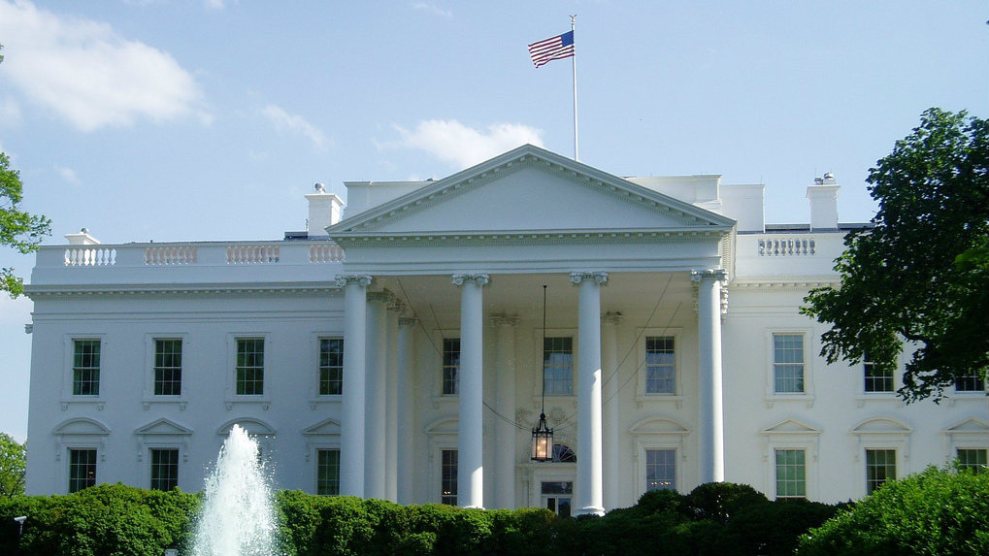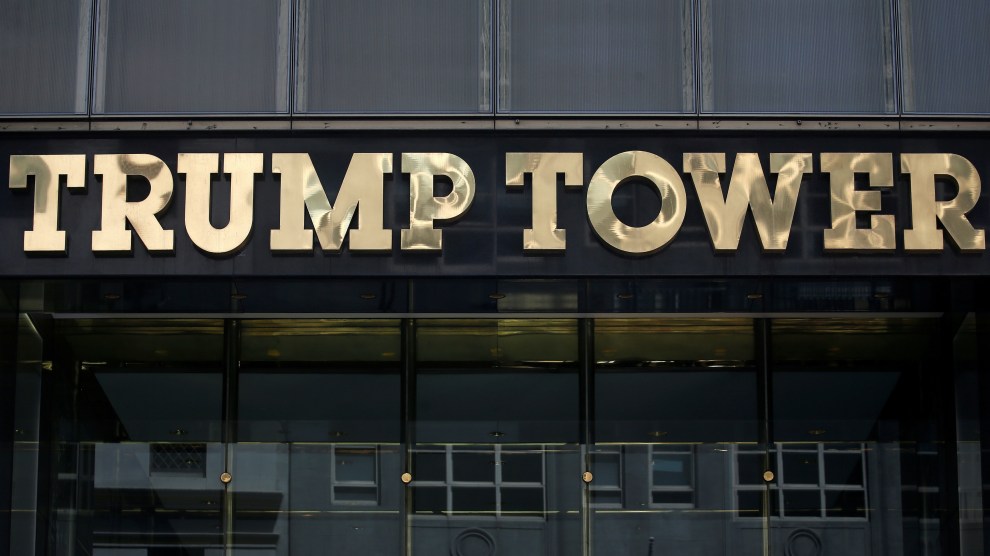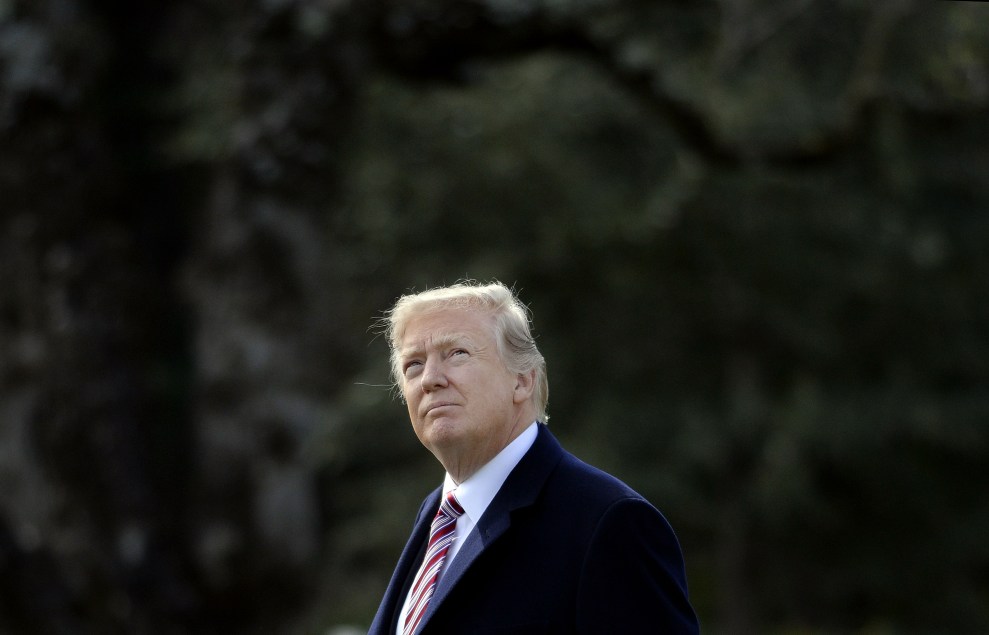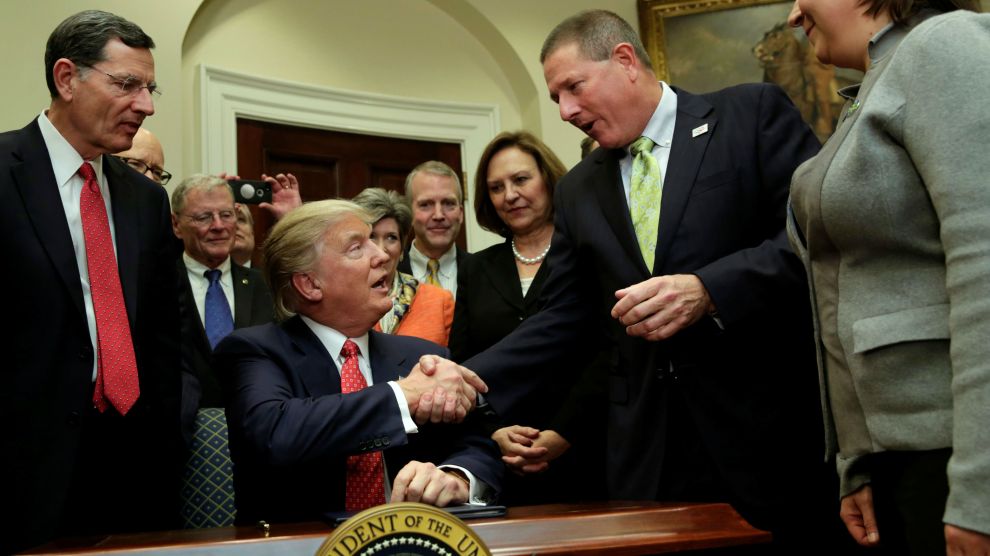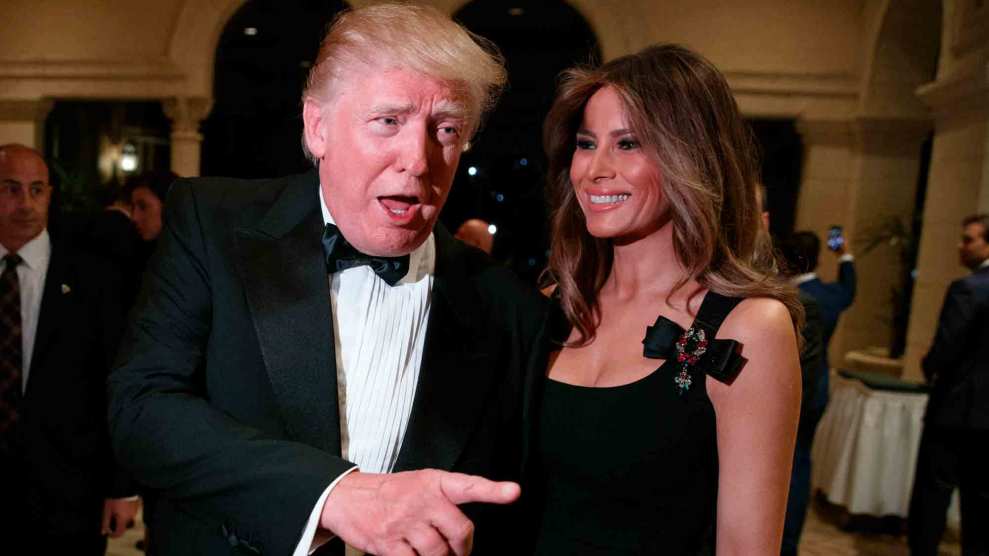
Evan Vucci/AP
Jessica Tillipman, a dean at the George Washington University Law School and an expert on government ethics and compliance, was recently giving an anti-corruption training to a roomful of visiting government officials from Latin America when something odd happened. As she described measures the United States has in place to guard against conflicts of interest, she heard snickering.
“Usually, I would see audiences in the past where they would look on kind of in awe” at the elaborate system the federal government has in place to prevent graft and corruption, Tillipman says. That has changed since the election of Donald Trump. Now, the overseas officials she trains point out that the United States can’t even get its own president to abide by the nation’s ethics standards and traditions. “It was almost a bit of a joke,” she says of the recent training. “To have countries with their own distinct corruption issues laughing at our current issues—it’s embarrassing.”
For decades, the United States has held itself up as a paragon of open and ethical government. On many fronts, the country has led by example, enacting tough anti-corruption and ethics statutes and leading the world in the enforcement of those laws. What’s more, the United States has used its reputation to prod other countries to clean up their acts, spending tens of millions of dollars every year via various federal programs to educate and train foreign officials and to encourage the passage of anti-bribery and transparency measures. But interviews with more than a dozen US and foreign experts show that the nation is losing its credibility as the world leader in clean government and fighting corruption, which is in turn affecting global efforts to combat government corruption.
Since his election, Trump and his administration have taken an openly hostile approach to guarding against conflicts and policing ethics standards. Trump and the Republican-led Congress have already rolled back efforts by the Obama administration to combat bribery and graft in the oil and gas industry. And there are indications that Trump may weaken the Foreign Corrupt Practices Act, the crown jewel of US anti-corruption laws that makes it illegal for an American company to pay off—knowingly or unknowingly—a foreign government official for preferential treatment.
“It’s hard to put lipstick on the pig: There’s a very, very different perceived reputation now than three or four months ago,” says Nathaniel Heller, an executive with Results for Development, a nonprofit that fights poverty, partly by encouraging government transparency. “It’s particularly acute because of the very real conflicts of interest and entanglements that the [Trump] family and administration seem to be deeply uninterested in trying to untangle.”
Jorge Hage, the former anti-corruption minister of Brazil, says the United States’ actions so far send “a very bad signal” to international partners. “Everyone seems to know (or hope) that the present administration is an exception, kind of an accident,” Hage says, “so that sooner or later, the US will go back to its traditional policy of promoting and emphasizing public integrity and transparency, and fighting corruption.”
Trump, unlike every other president in the modern era, has taken a dismissive approach to resolving potential ethics problems and conflicts of interest. He has refused to divest from his international real estate and licensing company, which means he will continue to enrich himself from his business while president. He hired two members of his immediate family—his daughter Ivanka and son-in-law Jared Kushner—to work in the White House. Senior staffers in the Trump administration skipped a customary ethics training course, which may help explain why aides to the president have on numerous occasions promoted the Trump family’s business interests in their official capacities.
In early January, hours after Trump said at a press conference he wouldn’t be taking the steps recommended by most ethics experts to avoid conflicts, the federal government’s top ethics watchdog pleaded with Trump to reconsider. If Trump failed to personally uphold a high standard, the ripples of that decision would be felt around the world, noted Walter Shaub, director of the nonpartisan Office of Government Ethics. “As we all know, one of the things that make America truly great is its system for preventing public corruption,” Shaub said in a rare public speech. “Our executive branch ethics program is considered the gold standard internationally and has served as a model for the world. But that program starts with the Office of the President. The president-elect must show those in government—and those coming into government after his inauguration—that ethics matters.”
Convincing lawmakers in corruption-plagued countries to change their laws—and asking prosecutors and law enforcement officials to have the courage to enforce those laws—is a tough enough sell, says Shruti Shah, vice president of programming and operations at the Coalition for Integrity, formerly the US chapter of Transparency International. Having a president who seems blithely unconcerned about his myriad conflicts of interest doesn’t help, she says. “We can’t tell people in Africa or anywhere else in the world to do anything we’re not doing ourselves.”
Foreign partners are scratching their heads at the way Trump has casually ignored concerns over conflicts of interest and his international business partners, she says. “It’s very difficult to explain to even anti-corruption activists that we do have these laws and they apply to members of Congress and people on the state level, but not the president,” Shah says.
All of this is a marked departure from Trump’s predecessor. While Barack Obama refused to even refinance his home mortgage out of concern that he would be accused of having a conflict of interest with the new lender, Trump entered office with more than $713 million in debt, much of it borrowed from banks that have clashed with federal regulators. The Obama administration was the first to publish the visitor logs that revealed the identities of most visitors to the White House. The Trump White House has yet to say if it will continue the practice. (Three open-government groups recently sued the administration over its refusal to release the visitor logs.)
The Obama administration supported the Cardin-Lugar provision in the 2010 Dodd-Frank financial reform law, a measure that would require oil and gas companies to publish their payments to foreign governments. Shortly after Trump’s inauguration, the Republican-led Congress voted to repeal the regulations enacting the Cardin-Lugar provision, which was set to go into effect sometime in the next year. The Trump White House issued a statement of administration policy supporting the repeal, and Trump later signed the bill into law on February 14.
And the Obama administration agreed to join the Extractive Industry Transparency Initiative (EITI), an effort to ramp up transparency of the money governments receive from oil and gas companies and to better track payments to combat rampant corruption in countries suffering from the so-called resource curse. Trump’s Department of Interior, meanwhile, has sent strong signals that it is backing away from the EITI, informing domestic participants that it was canceling all future meetings with civil-society and industry representatives involved in the effort. “They called and told us they were cancelling the meetings,” says Danielle Brian, executive director of the Project on Government Oversight and the co-chair of an EITI committee. A spokeswoman for the Interior Department disputed that the agency planned to exit EITI, saying that the United States “remains a strong supporter” but that “no decision has been made” about future implementation of the initiative.
The Obama administration also led in the creation of the Open Government Partnership (OGP), a network of governments and civil-society groups that worked on promoting transparency and accountability. Jeremy Weinstein, a former National Security Council member and senior diplomatic aide under Obama who helped launch OGP, told Mother Jones that the effort was a departure from prior presidencies because the United States had committed to making changes of its own while pressuring other countries to improve their policies. “As we began, when we arrived in 2009, to think about how to position the US for leadership, we were thinking about how to make up for some lost ground for our own practices,” Weinstein says. “To be an effective leader on these issues internationally, we need to be an effective leader domestically.” OGP launched in 2011, and since then the United States has produced three reports to the group outlining various domestic reforms, among them joining the EITI.
The Trump administration has yet to say whether it will continue working with OGP. (An official with the group says it has yet to hear from any Trump officials.) Not helping matters is the slow pace of staffing inside the administration: Undersecretary positions overseeing anti-corruption work at the State Department and the Treasury Department have yet to be filled.
At recent open-government conferences and meetings around the world, a question hangs over the proceedings: What’s going on in the United States? “It just sends a terrible message to countries that are trying to improve their governance,” says Dan Dudis with the good-government organization Public Citizen. “It takes the pressure off them [knowing] they’re not going to have the US State Department breathing down their neck to improve governance.”
The budget outline released by the administration proposes deep cuts to agencies that work on and fund open-government programs. It includes no specifics, but the outline calls for a 28 percent budget reduction at the State Department and the United States Agency for International Development (USAID), the agencies that oversee many of the government’s international anti-corruption efforts.
A diverse range of anti-corruption and pro-transparency projects around the globe are supported by the US government—so many programs from so many different agencies it’s difficult to tabulate a total. For example, since February, USAID directed $3 million to an ongoing anti-corruption effort in Jamaica, $972,000 to an anti-corruption effort in Ghana, and $634,000 for a program to fight corruption in the health care system of Albania. Since Trump’s inauguration, USAID has granted money to local chapters of international good-governance group Transparency International in the former Soviet republics of Georgia and Azerbaijan. The latter is a country considered one of the world’s most corrupt, where Trump partnered with the family of an Azeri oligarch to brand a hotel. (The deal collapsed, but questions remain about how much the Trump Organization knew about its business partners.)
More direct anti-corruption programs are funded through the Department of Justice, which in the early 1990s, following the collapse of the Soviet Union and the rise in international narco-crime syndicates, created the Office of Overseas Prosecutorial Development Assistance and Training (OPDAT). The program, which has offices in 50 countries, trains prosecutors and law enforcement around the world to spot and stop money-laundering, smuggling, and corruption. Among OPDAT’s more high-profile areas of work is an effort to fight corruption in Ukraine.
The DOJ—which also maintains an anti-kleptocracy unit to identify and recover assets from corrupt foreign leaders—is slated for a 4 percent budget cut ($700 million) under Trump’s proposed budget. Where those cuts will come is not clear, but the administration’s outline makes it clear that domestic programs to support a crackdown on immigration take priority in the agency while the cuts will come from unnamed “outdated programs.”
Some experts fear the Trump administration’s long-term goal may be to curb enforcement of the Foreign Corrupt Practices Act, if not neuter the law. The DOJ under Obama opened more FCPA cases than all prior administrations combined since 1977, the year the law was enacted. But Trump has for years expressed hostility toward the FCPA, saying the law puts American businesses at a “huge disadvantage” and that it was a “horrible law and it should be changed.” Part of Trump’s animosity might stem from his own experiences trying to take his brand global—a New Yorker investigation published in March found that the Trump Organization had potentially violated the FCPA as part of a development deal in Azerbaijan. (A company lawyer dismissed this claim.)
Trump’s picks to run the two agencies that spearhead FCPA cases, the Justice Department and the Securities and Exchange Commission, don’t inspire confidence. His choice to lead the Securities and Exchange Commission, a corporate lawyer named Jay Clayton, chaired a New York Bar Association committee that released a white paper in 2012 calling the United States’ current enforcement of the law “unilateral and zealous” and recommending “the reevaluation of the United States’ strategy in fighting foreign corruption.” Trump’s attorney general, Jeff Sessions, pledged during his confirmation hearings to uphold the FCPA, but some experts fear that budget cuts could still weaken enforcement even if the law is kept in place. “I would never question the integrity of the people who are pursuing these cases…but you can cut a budget,” says Chris Sanders, a spokesman for Transparency International. “You can reduce the numbers of investigators.”
Mary Beth Goodman, a former National Security Council member and anti-corruption expert under Obama, says US leadership on the issues of transparency and anti-corruption cuts both ways. If the United States commits to raising the bar on transparency and ethical standards, other countries feel compelled to follow. But if the United States all but abandons the fight, that signal could set off a race to the bottom around the world. “Very little gets done without US leadership,” Goodman says. “If we aren’t there constantly being the ones calling some of this action out and leading by example, it’s not going to continue to make progress.”


